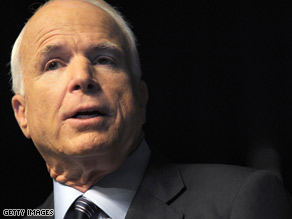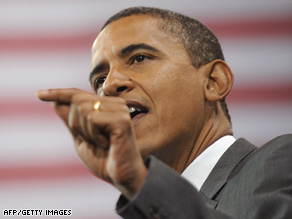
Barack Obama, right, attends a meeting at the White House with President Bush, John McCain and other politicians.
Sens. John McCain and Barack Obama met with President Bush and other politicians for a high-level meeting at the White House on Thursday afternoon to hash out an agreement on the $700 billion economic recovery plan.
But according to Sen. Richard Shelby, R-Alabama, who attended the meeting, "we will not have a deal."
Both candidates left the White House about 5 p.m. CNN has learned that Obama will give a statement outside the Mayflower Hotel in Washington. There is no word on whether McCain will talk to reporters about the meeting.
The meeting, according to the White House, included the following key players: Bush flanked at the table by Senate Majority Leader Harry Reid and House Speaker Nancy Pelosi, Obama and McCain on opposite ends of the table, House Minority Leader John Boehner and Senate Minority Leader Mitch McConnell also between the two presidential candidates and Vice President Dick Cheney across from Bush.
In a statement at the beginning of the meeting, Bush said he hopes for a deal to bail out Wall Street "very shortly."
He said the nation is in a "serious economic crisis" that needs to be dealt with "as quickly as possible" and that the historic meeting is "an attempt to move the process forward."
But according to several Republican aides, there is still major opposition to the "agreement on fundamental principles."
Don't Miss
The fact that House Republicans are still not coming on board poses a major obstacle for any kind of deal. Pelosi and other House Democratic leaders have repeatedly said that this is Bush's bill and that he and other GOP leaders need to get Republicans to support it.
McCain, who announced Wednesday that he was suspending his presidential campaign until a bailout plan was worked out, met with some Republican House members to try to bring more of them on board to back the agreement, according to a source in the room and one who was briefed on the meeting.
The gist of the meeting, according to sources, was that these members "aren't there yet" on the plan the Senate Banking Committee worked out and say there needs to be greater protection for taxpayers.
One Republican aide said that "not much has changed in the last 24 to 48 hours. I think it has to be pretty radically altered for House Republicans to support it."
This aide stressed, "at the end of the day, these members represent the people who sent them here, and the people who sent them here are so overwhelmingly opposed to this."
This aide said the calls coming into GOP offices are 90 to 1 against the plan.
Boehner, R-Ohio, has tapped a group of House Republicans to develop alternative ideas.
Earlier, Boehner released a statement that said, "I am encouraged by the bipartisan progress being made toward an economic package that protects the interests of families, seniors, small businesses, and all taxpayers."
It's unclear whether McCain agreed with this approach, but one aide said he put the principles "in his satchel to take over to the White House."
Republicans recognize that there is pressure building to get something done before the end of the week. "There sort of a tacit understanding among everyone that it has to happen before Monday," a third GOP aide said.
House Republican leaders are scheduled to meet at 5:30 p.m. ET in Boehner's office to talk about next steps and what comes out of the White House meeting.
Obama turned down McCain's suggestion that they both suspend their campaigns to focus on securing a deal on a bailout plan. He also passed on McCain's suggestion that they postpone Friday night's first presidential debate in Oxford, Mississippi.
Democrats fear that McCain will take credit for bringing reluctant Republicans around to agreeing with a bailout plan in order to bolster his argument that he would be a better leader in crises than Obama.
"The Democrats, of course, are very afraid that McCain is going to swoop into these delicate negotiations on Capitol Hill at the last minute and when they reach an agreement, he's going to claim credit for having brought those negotiations to a successful conclusion," CNN senior political researcher Alan Silverleib said.
A McCain source insists that the Arizona senator is aware of the politics involved and recognizes that Democrats -- and even some Republicans -- are wary of having it appear that McCain is brokering a deal.
The McCain source said his role in the meeting was to listen so he would know the lay of the land among Republicans before the White House meeting.
Both candidates touched on the economic crisis at former President Clinton's Clinton Global Initiative conference before heading to Washington.
McCain told the audience that it is not the time to engage in presidential politics.
"It's time for everyone to recall that the political process is not an end in itself, nor is it intended to serve those of us who are in the middle of it. In the Senate of the United States, our duty is to serve the people of this country," he said. ![]() Watch more of McCain's remarks »
Watch more of McCain's remarks »
"For the Congress, this is one of those moments in history when poor decisions made in haste could turn crisis into a far-reaching disaster if we do not act."
Obama also pressed his position on the crisis plaguing Wall Street -- and Main Street -- to Clinton's group.
"It's outrageous that we find ourselves in a position where taxpayers bear the burden and the risk for greed and irresponsibility on Wall Street and in Washington," he said. "But we also know that a failure to act would have grave consequences for the jobs, and savings, and retirement of the American people."
Obama also touched on his decision to keep on campaigning.
"Our election is in 40 days, our economy is in crisis, and our nation is fighting two wars abroad. ... The American people, I believe, deserve to hear directly from myself and Sen. McCain about how do we intend to lead our country," Obama said.
The initiative, founded by Clinton in 2005, is described as a "nonpartisan catalyst for action" bringing global leaders together to try to solve "some of the world's most pressing challenges."
'Politics' 카테고리의 다른 글
| Candidates Make Final Preparations for Debate 9ET USA (0) | 2008.09.27 |
|---|---|
| McCain to Attend Tonight's Presidential Debate (0) | 2008.09.27 |
| McCain suspends campaign, Obama plans to continue (0) | 2008.09.25 |
| US economy crisis, McCain Calls for Debate Delay to Focus on Financial Crisis (0) | 2008.09.25 |
| Economic Fears Give Obama Clear Lead Over McCain in Poll (0) | 2008.09.24 |









